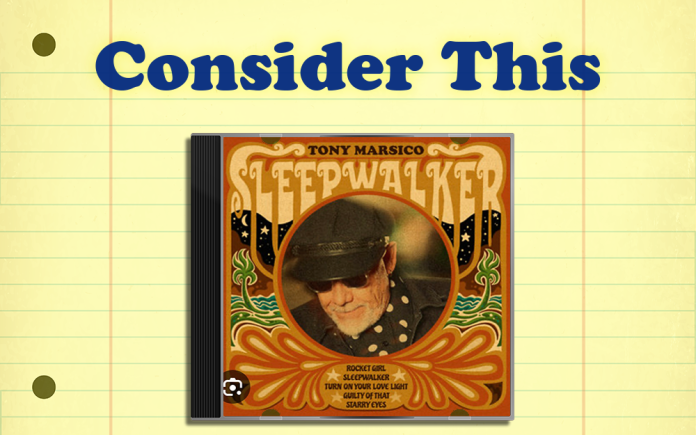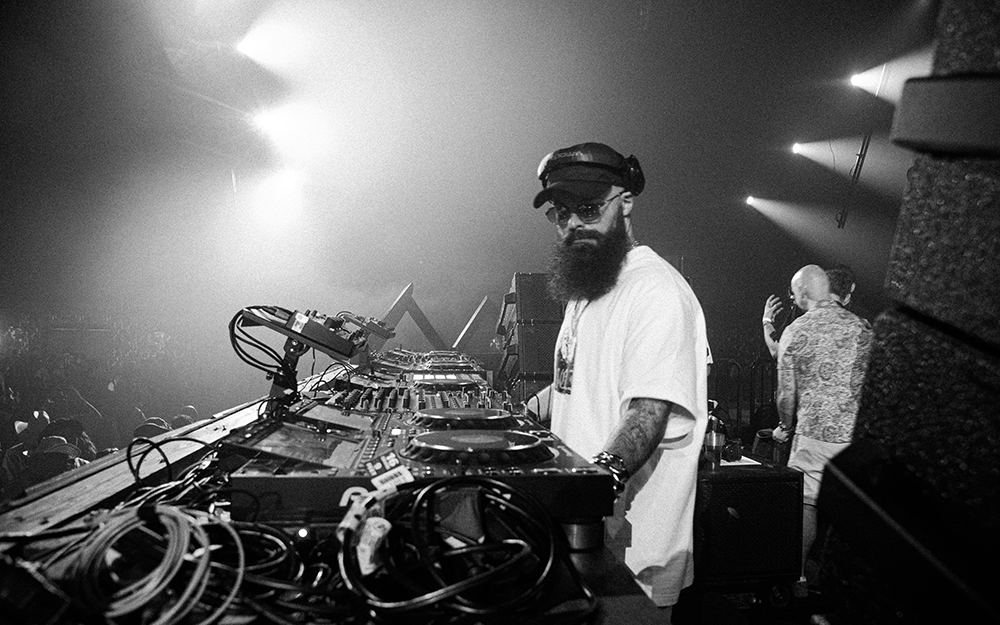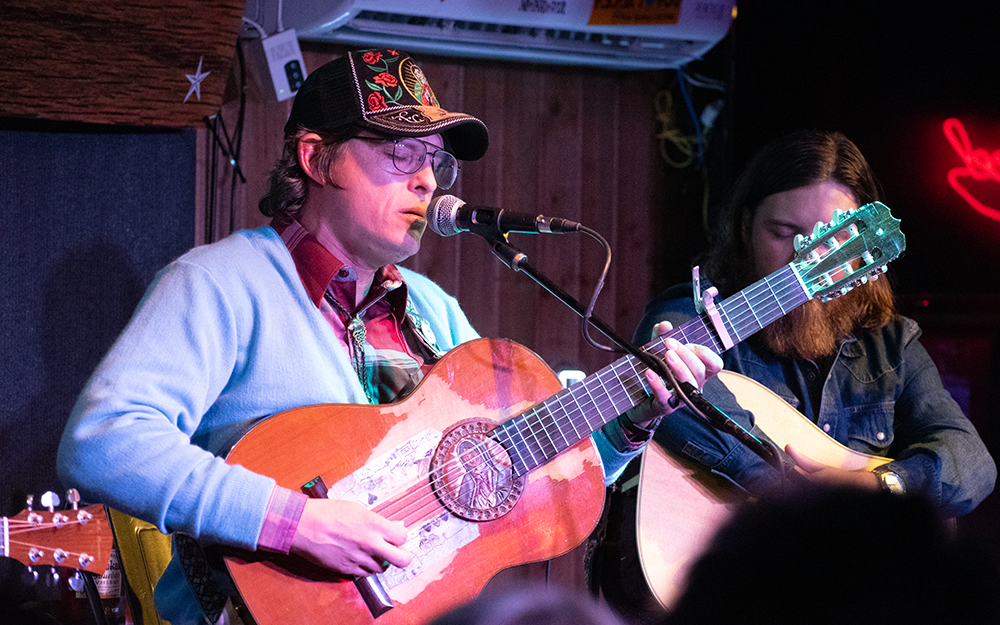
By Eleni P. Austin
If you look up the word indefatigable in the dictionary, chances are, next to the definition, there’s a picture of Tony Marsico. The Philadelphia native began earning his keep as a musician during his teens.
Relocating to Los Angeles, he connected with Tito Larriva and Charlie “Chalo” Quintana, vocalist/guitarist and drummer, respectively, for The Plugz, probably L.A.’s very first Latino Punk band. Their bassist had just quit, so they enlisted Tony, as well as guitarist Steve Hufstetler. The four-piece created some indelible music for the (now classic) indie Punk film, Repo Man, and even managed to impress Bob Dylan.
His Royal Bobness invited these scruffy Punks to his Malibu compound to woodshed, and within a couple months, he asked them to back him for his inaugural appearance on Late Night With David Letterman. Those performances recently saw the light of day on Bob’s Springtime In New York: The Bootleg Series Vol.16 (1984-85). As the Punk scene was on the wane, The Plugz took a page from Los Lobos’ playbook and tapped into their Latin heritage, reinventing themselves as Roots-Rockers, The Cruzados.
Although they inked a deal with major label Arista, toured with everyone from INXS, Joe Cocker and Fleetwood Mac (thanks to a personal invitation from Stevie Nicks), and had been touted as “the next big thing” by myriad music publications, real commercial success eluded them and they called it quits at the dawn of the ‘90s. Tony spent the remainder of the 20th century as an in-demand session player and touring musician. He anchored the low-end for everyone from John Doe, The Williams Brothers, Pee-Wee Herman, Roger Daltrey, Willie Nelson, Marianne Faithfull, Matthew Sweet and Neil Young.
He also managed to carve out an acting career, mostly playing musicians in films both ridiculous (Road House) and sublime (Georgia). He wrote a couple books, directed a couple of documentaries and recorded a couple of records with Darran “Dewey” Falcone as the Americana duo, Cisco & Dewey. As leader of the Martini Kings, he’s recorded more than 20 albums with the Jazz/Swing combo, playing for everyone from titans of industry to Kings and a Kardashian or two.
As the Covid pandemic began to surge, Tony was gripped by the urge to Rock a little harder. He was hoping to reunite The Cruzados, but geographical differences and prior commitments made it impossible. With the remaining band members’ blessings, Tony recruited pals Loren Molinare and Ron Young from the band, Little Caesar. Originally part of the late ‘80s L.A. Hair Metal/Grunge scene, the band, with a couple line-up changes, had never stopped making music. With this new iteration of The Cruzados, they recorded a minty fresh new album, She’s Automatic, in 2021. Following successful American and European tours, released an EP, Land Of The Endless Sun and a live effort, La Invasion De Los Cruzados just a few months ago.
Somewhere between Cruzados and Martini Kings commitments, Tireless Tony has found time to release Sleepwalker, a five-song EP that allows him to flex some different musical muscle. The record blasts off with “Rocket Girl,” a pslightly Psychedelic groover powered by low-slung guitars, space-age keys, slinky bass and a mindbender backbeat. Lyrics pay homage to a stratospheric love fueled by a cosmic connection; “You’re my Rocket Girl up in the sky, a shot of flames that never dies, a shooting star, a burst of fire, you fill my soul with a burning desire.” A combustible guitar solo sparks and flickers on break, as meandering e-bow notes cool at the earth’s core.
Joni Mitchell once sent a telegram to Graham Nash that read “If you hold sand too tightly in your hand, it will run through your fingers.” That leitmotif seems to flow through both “I’m Guilty Of That” and “Turn On Your Lovelight.” The thunking backbeat that opens former exhibits a bit of Spector-esque/”Be My Baby” heft, before locking into a Jangle-Pop groove. Chiming guitars, and wily bass lines wrap around lush harmonies. The opening verse finds a clingy romance quickly unraveling; “Lock me up and throw away the key, I was blind now it’s clear to see when I held you tight you only wanted to be free, like a shooting star in the sky, love faded it all but died, I sit and wait and I just wonder why.” Shimmery guitars on the break are suffused in heartbreak. Yet, despite Tony’s sincere mea culpa, as the song progresses, the blame shifts on the chorus:
“I’m sorry, sorry, sorry, so sorry, if I loved you too much, I guess I’m guilty of that, if I loved you to much, I guess I’m guilty of that.”
The latter lattices honeyed harmonies atop ringing guitars, shivery bass and a chunky beat. The melancholy melody shares some musical DNA with The Who’s “Cut My Hair,” This time out, lyrics attempt to coax a clinically depressed ex off a metaphorical ledge: “Come out of the darkness and into the light, the sadness you feel, fills up the night, now the birds in the trees sing a sad song, I can’t remember when things went so wrong.” Basically, love is the ultimate panacea, but only if she runs back to him.
If it were possible to jump into Sherman and Mr. Peabody’s Wayback Machine, time-traveling back to the the Sunset Strip, circa 1965, and the era of KHJ Boss Radio, the title-track would sandwich nicely between The Byrds’ “I’ll Feel A Whole Lot Better” and The Beatles’ “Ticket To Ride.” Jingle-jangle guitars partner with knotty bass lines and a propulsive beat. Meanwhile, lyrics plead for a second chance to mend a broken romance: “If you look inside your soul, can you tell me what went wrong, time takes it’s toll, the nights are long, your face follows wherever I go, can I come to you tonight, just give me a chance to make it right.” A soaring, 12-string style guitar solo flies high above the iridescent arrangement, galvanized by celestial backing vocals.
The EP winds down with a trenchant take on Roky Erickson’s “Starry Eyes.” The Texas legend fronted proto-Psych/Garage Rockers, The 13th Floor Elevators, but his career was derailed by mis-diagnosed mental heath issues. Still, he persevered and with the help of famous fans like The Butthole Surfers, Doug Sahm, ZZ Top, Jesus & Mary Chain and Henry Rollins, maintained a sporadic
music career until he passed away in 2019. While the original felt like a ragged-but-right homage to another Lone Star State progenitor, Buddy Holly, Tony takes a more nuanced approach. Ramshackle guitars are tethered to prowling bass lines, fluttery keys and a galloping backbeat. Urgent lyrics yearn for a quixotic connection: “Starry eyes, how can I get to you…just when I’m alone, I hear and feel you, I wish that I could reach right out and touch you, but knowing you’re the one to greet me and meet me, two alone in the dark, maybe.” This driving rocker is the perfect finish to a surprisingly ‘60s flavored EP.
A solo album in name only, Tony sang, played bass and some guitar. He received some superstar assistance from Jonathan Lea on guitar and e-bow, Rob Klonel on drums and percussion, plus Loren Molinare on additional guitar and Janelle Freese on percussion. Carla Olson and Tommy Lavin added backing vocals. Tommy produced four of the songs, while Carla produced the title track.
For some of us, down-time is a luxury. But to Tony, it’s almost a punishment. Lucky for us, because it allows him to step out of his comfort zone. Sleepwalker is crisp, concise and compelling. More please.










































